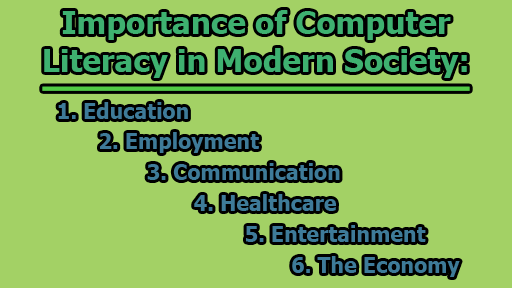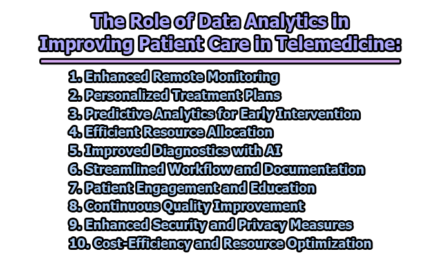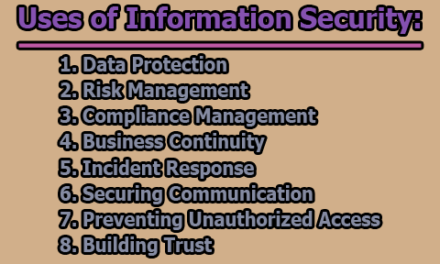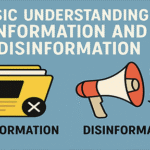Importance of Computer Literacy in Modern Society:
In the digital age, computer literacy has become an essential skill that permeates all aspects of modern society. As technology continues to advance at an unprecedented pace, the ability to navigate and understand computers and related technologies has evolved from a nice-to-have skill to a fundamental requirement. Here, we explore the multifaceted importance of computer literacy in modern society, examining its impact on education, employment, communication, healthcare, entertainment, and the economy.
1. Education: Computer literacy plays a pivotal role in modern education, transforming the way students learn and teachers teach. Here are some key aspects of its importance in this context:
a. Access to Information: The internet is a vast repository of knowledge, and computer literacy enables students to access this wealth of information instantly. With a few clicks, students can research topics, access academic journals, and find educational resources that enrich their learning experience.
b. Online Learning: The rise of online education platforms, often referred to as e-learning, has made education more accessible than ever before. Computer literacy is crucial for students to participate in online courses, which can be a cost-effective and flexible way to pursue education.
c. Digital Skills: In today’s world, digital skills are a must-have. From creating documents and spreadsheets to using specialized software for subjects like mathematics or graphic design, students need computer literacy to excel in their studies.
d. Critical Thinking: Computer literacy also encourages critical thinking. Students must evaluate the credibility of online sources, analyze data, and solve complex problems using technology. These skills are not only important for academics but also for real-world problem-solving.
e. Educational Tools: Teachers use various software and online tools to enhance their teaching methods. Students who are computer literate can benefit from these tools, which often make learning more engaging and interactive.
2. Employment: The job market is constantly evolving, and computer literacy is now a prerequisite for many professions. Here’s why it is essential for employment:
a. Job Opportunities: Many jobs today require at least basic computer skills. From office jobs that involve using word processors and email to highly specialized roles in fields like IT and programming, computer literacy opens up a wide range of employment opportunities.
b. Career Advancement: In addition to opening doors to employment, computer literacy is often a key factor in career advancement. Those who are proficient with computers can take on more responsibilities, work more efficiently, and adapt to new technologies, making them valuable assets to employers.
c. Remote Work: The COVID-19 pandemic accelerated the shift toward remote work. Computer literacy is now more critical than ever, as remote workers rely on technology to collaborate, communicate, and complete their tasks.
d. Digital Literacy and Cybersecurity: Computer literacy includes an understanding of digital literacy and cybersecurity. As cyber threats become more sophisticated, employees who are knowledgeable about online safety and data protection are essential for organizations.
3. Communication: Computer literacy has revolutionized the way we communicate. It has transcended geographical boundaries and transformed interpersonal interactions in numerous ways:
a. Social Media: Social media platforms are central to modern communication. Being computer literate allows individuals to connect with friends and family, share updates, and participate in online communities.
b. Email and Messaging: Email remains a vital communication tool in both personal and professional settings. Computer literacy is essential for composing, sending, and managing emails effectively. Additionally, instant messaging apps have become ubiquitous, further emphasizing the importance of computer literacy in communication.
c. Video Conferencing: The COVID-19 pandemic highlighted the significance of video conferencing tools for remote work and virtual meetings. Computer literacy is crucial for using platforms like Zoom, Microsoft Teams, or Google Meet for effective communication.
d. Information Dissemination: With the rise of blogging, vlogging, and podcasting, individuals have become content creators and distributors. Computer literacy enables people to produce and share content with a global audience, impacting public discourse and awareness.
4. Healthcare: Computer literacy has transformed healthcare in numerous ways, from electronic health records (EHRs) to telemedicine:
a. Electronic Health Records (EHRs): EHRs have digitized patient records, making them easily accessible to healthcare providers. Computer literacy is essential for medical professionals to navigate and update these records accurately.
b. Telemedicine: Telemedicine has gained popularity, allowing patients to consult with healthcare providers remotely. Patients need computer literacy to access telehealth services, and healthcare professionals require it to conduct virtual consultations.
c. Medical Research: Computer literacy is crucial for medical researchers who rely on computer-based tools and software to analyze data, simulate experiments, and collaborate with colleagues worldwide.
d. Patient Education: Patients use the internet to research medical conditions, medications, and treatment options. Computer literacy empowers individuals to make informed healthcare decisions and communicate effectively with their healthcare providers.
5. Entertainment: Computer literacy has transformed the entertainment industry, offering new forms of entertainment and changing how we consume media:
a. Streaming Services: Platforms like Netflix, Hulu, and Disney+ have revolutionized how we watch TV shows and movies. Computer literacy is necessary to access and use these services on various devices.
b. Gaming: Video games have become a massive industry, and computer literacy is essential for playing games on consoles, PCs, and mobile devices. Additionally, game development requires computer skills.
c. Content Creation: From YouTube to TikTok, individuals can create and share their own content online. Computer literacy enables content creators to edit videos, design graphics, and manage their online presence effectively.
6. The Economy: The importance of computer literacy extends to the broader economy:
a. E-commerce: E-commerce has revolutionized the way we shop, and computer literacy is vital for online consumers. It’s also essential for entrepreneurs and businesses looking to establish an online presence and sell products or services.
b. Digital Marketing: Businesses rely on digital marketing to reach their target audience. Understanding how to use digital marketing tools and platforms is crucial for marketing professionals.
c. Data Analysis: Data is often referred to as the “new oil.” Computer literacy is essential for individuals who work with data, from data scientists and analysts to business professionals who need to interpret data to make informed decisions.
d. Innovation and Entrepreneurship: Innovation drives economic growth, and many innovative ideas require computer-based technologies. Entrepreneurs who are computer literate can turn their ideas into reality and create startups that contribute to the economy.
In conclusion, computer literacy is a foundational skill that underpins various aspects of modern society. It empowers individuals to access information, engage in education, secure employment, communicate effectively, manage their health, find entertainment, and contribute to the economy. As technology continues to advance, computer literacy will remain an essential skill for individuals and societies to thrive in the digital age. Encouraging and promoting computer literacy should be a priority in education and workforce development initiatives to ensure that everyone can reap the benefits of the digital revolution.

Assistant Teacher at Zinzira Pir Mohammad Pilot School and College










